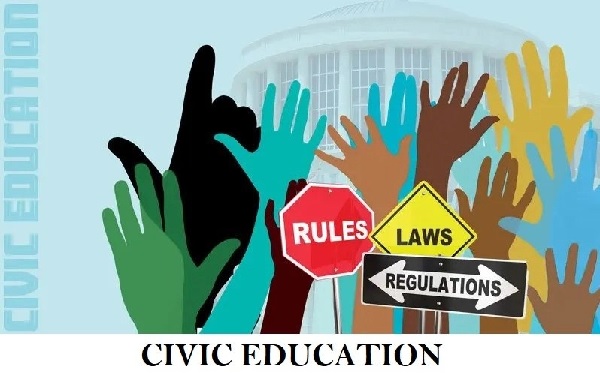Civic education is an effective tool geared toward building civic competence and promoting political awareness and participation, as well as exposing citizens to their rights and duties. There are four types of civic education which include political knowledge, normative values, individualistic civic behaviour, and communal civic behaviour. In this article, we’ll be discussing each of the aforementioned types of civic education in Nigeria.

The types of civic education in Nigeria would be discussed below:
-
Political Knowledge
As a democratic nation, political knowledge is an important aspect of civic education that is necessary to attain political literacy in Nigeria. The Independent National Electoral Commission (INEC), political parties, civil societies, and public forums participate in the transmission of political knowledge, skills, and attitude to the citizens to make them more informed and participate in the political process.
When citizens are not politically knowledgeable they can’t engage in public issues relating to politics and would be less inclined to participate in the political process. Issues like violence during elections, low voter turnout, and disinterestedness of the voting population are some ways a lack of political knowledge can impact the political process. On the other hand, citizens with basic political knowledge are more likely to be involved in political conventional activities like registration as a voter, voting at the polls, contesting for political offices, and discussing politics.
With an election just around the corner, it is imperative that political parties, traditional institutions, civil societies, media organizations, non-governmental organizations, and the electoral umpire, INEC, engage in educating the citizenry to help them learn more about political phenomena, build political trust, reduce voter apathy, build democratic support and values, as well as encourage political participation.
-
Normative Values
Normative value is an aspect of civic education that deals with instilling values in members of society to enable them to function effectively in the public sphere. In this regard, it is assumed that human beings are first and foremost driven by values, aptitudes, and dispositions and not knowledge. The sort of values that this aspect of civic education seeks to instill in citizens are those that relate to self, as well as values that relate to encounters with others. In addition, values that relate to society and the natural environment as well.
These normative values that serve to maintain social order are instilled in individuals from childhood and in schools. The following values are valuable to every society: honesty, solidarity, responsibility, cooperation, justice, industry, sincerity, freedom, courtesy, autonomy, and respect, hard work, faithfulness, perseverance, contentment, among others.
These normative values act as criteria for the judgment of the actions of individuals in society, as well as help in decision-making. This aspect of civic education works to encourage a sense of responsibility among Nigerian citizens, encourage tolerance and help young adults resist peer pressure. In addition, these values promote self-reliance in society, which in turn provides employment opportunities for members of society.
-
Individualistic Civic Behaviour
Individualistic civic behaviour is an aspect of civic education that prioritizes the development of individual skills as opposed to collective. This type of civic education views individuals as being unique and separate units, hence it emphasizes individuals developing self-oriented values and skills that benefit independence.
Since individuals are viewed as independent, this aspect of civic education assumes that everyone has free will, and as such can choose to do what they feel is best for them, and live with the consequences of their actions. Examples of individualistic behaviours that this type of civic education promotes include independence, self-sufficiency, individual achievement, independent living, strong individual property rights, the pursuit of individual goals, competition between individuals, and self-determination.
-
Communal Civic Behaviour
In this type of civic education, emphasis is placed on society as a unit, unlike the individualistic aspect that focuses on individuals. Here, society is seen as a connection between the individuals that compose it, and this aspect of civic education sees individuals as social creatures that can feel accomplished only when they take part in a broader social context. Hence, communal civic education aims to elicit feelings of membership and affiliation with a larger group.
Components of political knowledge such as facts regarding the shared history of a larger community (extended family, village, state, tribe, country, etc.), as well as normative values like loyalty and the willingness to sacrifice are also included in communal civic education. In this aspect of civic education, younger people or socially lower people are taught to behave respectfully and obediently when dealing with older or people of higher social class.
Some of the traits that communal civic education strives to promote include obligations to other members of a group, reliance on a group, adherence to traditional values, maintenance of traditional practices, hierarchical decision-making, and the sharing of property within a group. In addition, living with kin, fulfillment of roles within a group, and group achievement are attributes of communal civic education.
In a democratic society such as Nigeria, civic education is an essential tool aimed at developing good citizens that are well-informed to participate effectively in the democratic process. Civic education is continuous and aimed at every aspect of the population including school children and students, military and security forces, public officials, non-governmental organizations activists, the elderly, prisoners and other risk groups. The family, schools, religious bodies, community members, government agencies, civil societies, media agencies, political parties, and traditional institutions are involved in civic education.
The advantages of civic education are felt by both individuals and society. It helps citizens understand the structures of the government as well as educate them on how legislation and policymaking work in Nigeria. Furthermore, civic education improves the democratic responsibility of elected public officials, increases voting and political participation, promotes youth empowerment, and exposes individuals to civic values and appropriate social behaviour.